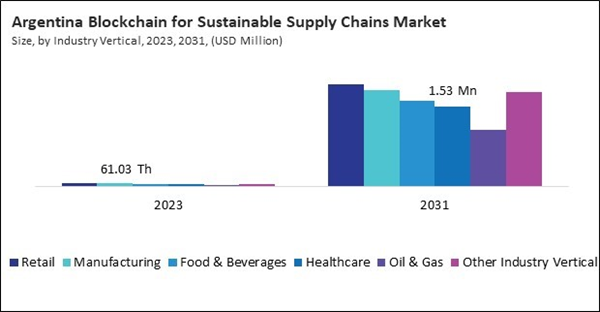The Brazil market dominated the LAMEA Blockchain for Sustainable Supply Chains Market by country in 2023, and is expected to continue to be a dominant market till 2031; thereby, achieving a market value of $32.74 millions by 2031. The Argentina market is showcasing a CAGR of 54.2% during 2024-2031. Additionally, the UAE market would register a CAGR of 50.8% during 2024-2031.
The pharmaceutical industry is leveraging blockchain to ensure the authenticity and safety of drugs, reducing the risk of counterfeit products in the supply chain. The fashion industry is increasingly adopting blockchain to trace the lifecycle of garments, promoting ethical labor practices and sustainable sourcing of raw materials. Blockchain technology fosters sustainability in supply chains by addressing key challenges.
The pharmaceutical industry is leveraging blockchain to ensure the authenticity and safety of drugs, reducing the risk of counterfeit products in the supply chain. The fashion industry is increasingly adopting blockchain to trace the lifecycle of garments, promoting ethical labor practices and sustainable sourcing of raw materials. Blockchain technology fosters sustainability in supply chains by addressing key challenges.
The UAE’s status as one of the world’s top oil producers and its increasing natural gas reserves, particularly in Abu Dhabi, position the country as a key player in global energy markets. Integrating blockchain technology in the supply chain, especially in sectors like oil and gas, has immense potential to enhance transparency, traceability, and efficiency. Blockchain can streamline the complex logistics involved in oil production and distribution, reducing fraud and ensuring that resources are tracked sustainably throughout their supply chain journey. Blockchain technology has immense potential to optimize healthcare supply chains by ensuring secure and transparent transactions, reducing inefficiencies, and preventing fraud. The integration of blockchain can be critical in managing the complex distribution of medical supplies, pharmaceuticals, and even patient records while maintaining the highest data security and traceability standards. In conclusion, the convergence of key sectors like oil production and healthcare with blockchain technology for sustainable supply chains will drive transformation in the UAE and Saudi Arabia.
List of Key Companies Profiled
- IBM Corporation
- Microsoft Corporation
- SAP SE
- Oracle Corporation
- Accenture PLC
- Dell Technologies, Inc.
- Intel Corporation
- Walmart, Inc.
- Bitfury Group Limited.
- OriginTrail
Market Report Segmentation
By Enterprise Size- Large Enterprise
- SMEs
- Retail
- Manufacturing
- Food & Beverages
- Healthcare
- Oil & Gas
- Other Industry Vertical
- Brazil
- Argentina
- UAE
- Saudi Arabia
- South Africa
- Nigeria
- Rest of LAMEA
Table of Contents
Companies Mentioned
- IBM Corporation
- Microsoft Corporation
- SAP SE
- Oracle Corporation
- Accenture PLC
- Dell Technologies, Inc.
- Intel Corporation
- Walmart, Inc.
- Bitfury Group Limited.
- OriginTrail









